-
 Bitcoin
Bitcoin $103,668.9987
1.66% -
 Ethereum
Ethereum $2,645.0693
8.80% -
 Tether USDt
Tether USDt $1.0000
-0.01% -
 XRP
XRP $2.5609
4.94% -
 Solana
Solana $180.3728
6.89% -
 BNB
BNB $659.9335
2.07% -
 USDC
USDC $1.0001
0.01% -
 Dogecoin
Dogecoin $0.2378
8.03% -
 Cardano
Cardano $0.8185
4.39% -
 TRON
TRON $0.2714
2.99% -
 Sui
Sui $3.9685
2.05% -
 Chainlink
Chainlink $17.2043
5.91% -
 Avalanche
Avalanche $26.0497
9.53% -
 Stellar
Stellar $0.3101
3.19% -
 Shiba Inu
Shiba Inu $0.0...01612
7.18% -
 Pi
Pi $1.2670
22.11% -
 Hedera
Hedera $0.2121
3.88% -
 Hyperliquid
Hyperliquid $25.5834
8.04% -
 Toncoin
Toncoin $3.4249
5.72% -
 Polkadot
Polkadot $5.1723
6.25% -
 UNUS SED LEO
UNUS SED LEO $8.7934
2.30% -
 Bitcoin Cash
Bitcoin Cash $407.5382
2.52% -
 Litecoin
Litecoin $103.8516
3.63% -
 Monero
Monero $343.7295
3.06% -
 Pepe
Pepe $0.0...01390
6.66% -
 Bitget Token
Bitget Token $4.7986
3.73% -
 Dai
Dai $0.9999
-0.02% -
 Ethena USDe
Ethena USDe $1.0006
0.00% -
 Uniswap
Uniswap $6.9232
4.81% -
 Bittensor
Bittensor $459.6444
2.76%
How to protect wallet backup files through encryption technology?
Secure your crypto wallet backups using strong encryption (AES-256 or PGP), robust passwords/passphrases, and MFA. Regularly back up keys, utilize HSMs for enhanced protection, and store encrypted files offline for optimal security.
Mar 05, 2025 at 02:54 am
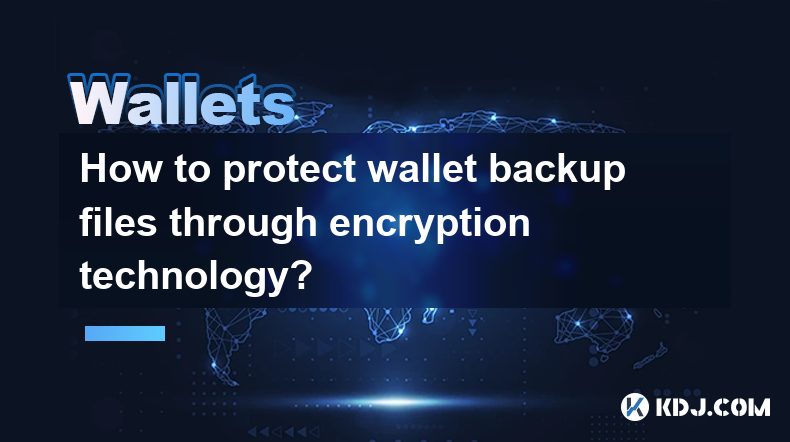
Key Points:
- Understanding the vulnerabilities of wallet backup files.
- Exploring various encryption methods for securing backups.
- Implementing strong passwords and passphrase management.
- Utilizing hardware security modules (HSMs) for enhanced protection.
- Employing multi-factor authentication (MFA) for added security.
- Regularly backing up and updating encryption keys.
- Best practices for storing encrypted backup files.
How to Protect Wallet Backup Files Through Encryption Technology?
Cryptocurrency wallets, whether software or hardware, hold the keys to your digital assets. Losing access to your wallet, often due to a lost or compromised backup file, can mean irreversible loss of funds. Therefore, securing your wallet backup files through robust encryption is paramount. This involves understanding the threats and implementing the right security measures.
The most significant threat to your wallet backup files is unauthorized access. This could stem from malware, phishing attacks, physical theft, or even simple negligence resulting in the loss or compromise of the backup. Encryption acts as a shield, transforming your readable backup into an unreadable format unless you possess the correct decryption key.
Several encryption methods exist, each with varying levels of security. Simple password protection, while convenient, is susceptible to brute-force attacks if a weak password is used. More robust options include AES-256 encryption, a widely accepted standard offering strong protection against unauthorized access. PGP (Pretty Good Privacy) encryption is another viable choice, especially for larger backup files.
Strong password selection is critical. Avoid easily guessable passwords. Instead, use a password manager to generate and securely store complex, unique passwords for each of your wallet backups. A long, random passphrase offers even stronger protection than a simple password.
Hardware Security Modules (HSMs) provide a higher level of security. These physical devices are designed to protect cryptographic keys and perform encryption operations in a tamper-resistant environment. While more expensive than software solutions, HSMs are ideal for individuals holding significant cryptocurrency holdings.
Multi-factor authentication (MFA) adds another layer of security. By requiring multiple forms of authentication, such as a password and a one-time code from an authenticator app, you significantly reduce the risk of unauthorized access, even if one factor is compromised.
Regularly backing up your encryption keys is crucial. Losing your keys renders your encrypted backup useless. Store multiple copies of your keys, using different methods and locations. Employ version control for your keys to easily track changes and restore previous versions if necessary. Consider using a secure cloud storage service with robust encryption, but be mindful of the risks associated with third-party providers.
Storing Your Encrypted Backup Files Safely:
The location where you store your encrypted backup files is just as important as the encryption method itself. Avoid storing backups on easily accessible devices like smartphones or computers that are routinely connected to the internet. Consider using offline storage solutions, such as external hard drives kept in a secure location, or even a safety deposit box.
Another layer of security can be added by splitting your backup files across multiple storage locations. This way, even if one location is compromised, you still retain access to your backups. Remember that redundancy is key.
Common Questions:
Q: What is the best encryption algorithm for wallet backups?
A: AES-256 is a widely accepted and robust encryption standard, offering a strong balance between security and performance. PGP is also a viable option, especially for larger files. The choice ultimately depends on your technical expertise and the level of security you require.
Q: How often should I back up my wallet and update my encryption keys?
A: You should back up your wallet regularly, at least once a month, and update your encryption keys whenever you suspect a compromise or simply as a good security practice. Consider using a version control system to track changes.
Q: Are cloud storage services safe for storing encrypted wallet backups?
A: Cloud storage can be used, but only with reputable providers that offer strong encryption and security features. However, it's crucial to remember that you are entrusting your data to a third party, introducing a level of risk. Offline storage methods are generally considered safer.
Q: What should I do if I lose my encryption key?
A: Losing your encryption key means you'll likely lose access to your cryptocurrency. That’s why redundancy and multiple backups are crucial. If you have multiple backups, and access to a previous version of the key, you can try to recover access. Otherwise, the funds will be lost.
Q: Is using a password manager sufficient for securing my wallet backups?
A: While a password manager is a good start, it’s not sufficient on its own. It's essential to combine it with strong encryption methods, regular backups, and other security practices. A password manager simply manages your passwords; it doesn’t encrypt your files.
Q: Can I use the same password for multiple wallet backups?
A: Absolutely not. Using the same password for multiple backups significantly increases the risk of losing all your funds if one backup is compromised. Always use unique, strong passwords for each backup.
Q: What is the difference between a passphrase and a password?
A: A passphrase is a longer, more complex string of characters, often containing words and phrases, making it significantly harder to crack than a typical password. Passphrases are generally more secure.
Q: How do I know if my wallet backup file has been compromised?
A: There's no foolproof way to know without actively monitoring your system for malicious activity. Signs may include unusual software behavior, unexpected network activity, or attempts to access your wallet. Regular security scans and vigilance are essential.
Disclaimer:info@kdj.com
The information provided is not trading advice. kdj.com does not assume any responsibility for any investments made based on the information provided in this article. Cryptocurrencies are highly volatile and it is highly recommended that you invest with caution after thorough research!
If you believe that the content used on this website infringes your copyright, please contact us immediately (info@kdj.com) and we will delete it promptly.
- Qubetics Emerges as the Infrastructure-Backed Project to Watch, Outperforming All Other Cryptos in ROI Projections
- 2025-05-14 11:05:13
- Toncoin (TON) Shows Early Signs of Consolidation After Notable Rally
- 2025-05-14 11:05:13
- While PEPE and SHIB Chase Pumps, Web3 ai Builds Real AI Tools With Huge ROI Potential of 1747%
- 2025-05-14 11:00:30
- title: Crypto Market Poised to Replicate the Dot-com Bubble, Triggered by a Surge in Internet Adoption
- 2025-05-14 11:00:30
- OM (OM) Token Could Hit $1 Soon: Here's a Grounded Take
- 2025-05-14 10:55:13
- XRP Price To Still Rally To $1,000
- 2025-05-14 10:55:13
Related knowledge
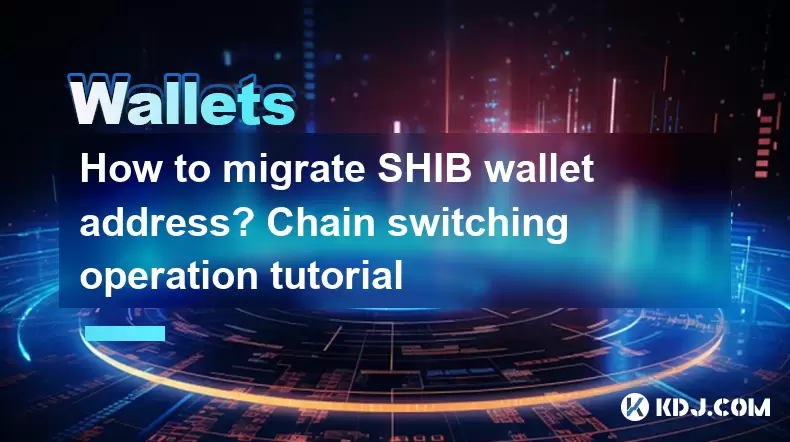
How to migrate SHIB wallet address? Chain switching operation tutorial
May 14,2025 at 07:35am
Migrating your SHIB wallet address and performing a chain switching operation can be crucial for managing your cryptocurrency effectively. This process involves several steps that need to be followed carefully to ensure that your assets remain secure and accessible. In this tutorial, we will guide you through the process of migrating your SHIB wallet ad...
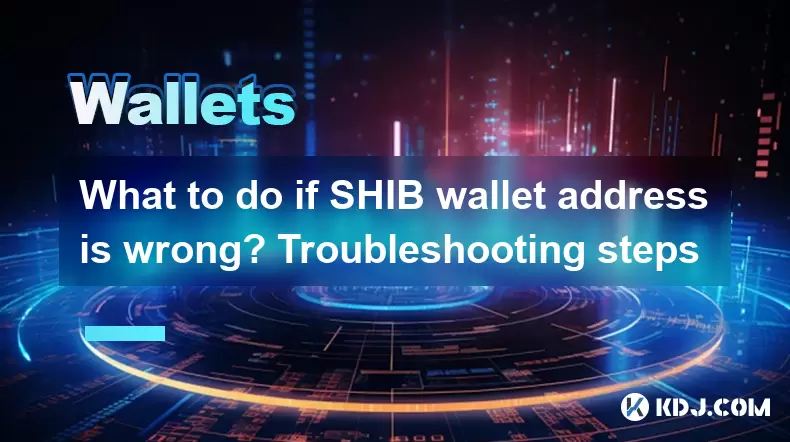
What to do if SHIB wallet address is wrong? Troubleshooting steps
May 14,2025 at 04:28am
If you've entered the wrong SHIB wallet address, it can be a stressful situation, especially if you've already sent your SHIB tokens. However, there are several steps you can take to troubleshoot and potentially resolve the issue. Let's walk through the process step-by-step. Verify the Transaction DetailsThe first thing you should do is verify the trans...
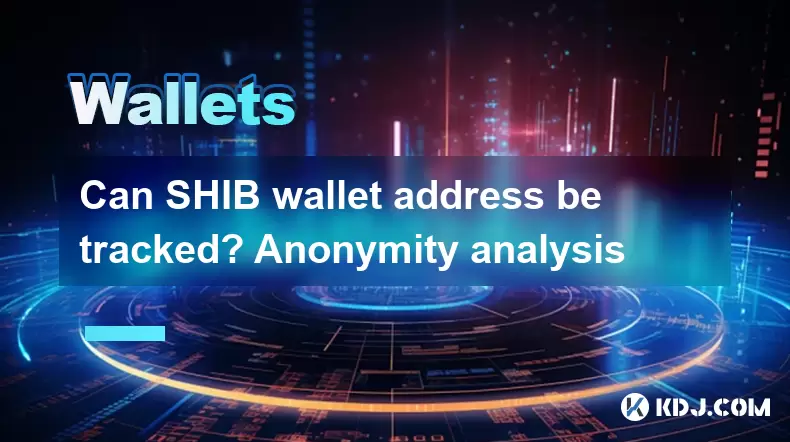
Can SHIB wallet address be tracked? Anonymity analysis
May 14,2025 at 06:50am
The question of whether a SHIB wallet address can be tracked and the level of anonymity it provides is a crucial concern for many users in the cryptocurrency space. SHIB, or Shiba Inu, is a popular meme token that operates on the Ethereum blockchain. Understanding the traceability of SHIB wallet addresses involves delving into the nature of blockchain t...
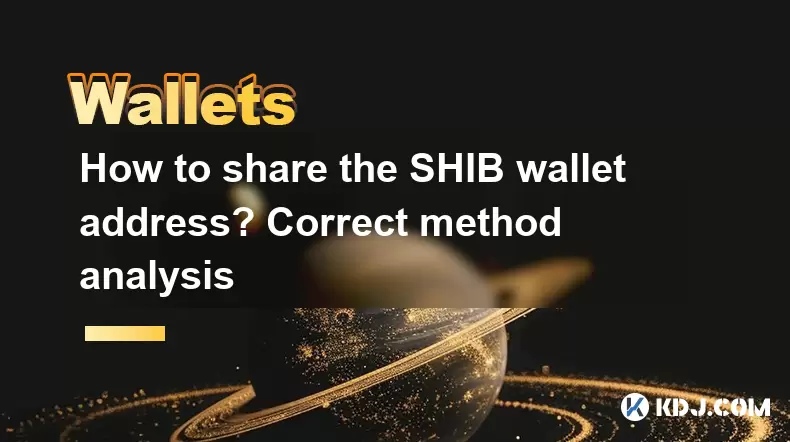
How to share the SHIB wallet address? Correct method analysis
May 14,2025 at 02:50am
Sharing your SHIB wallet address is a common task for those involved in the cryptocurrency world, particularly if you're dealing with Shiba Inu (SHIB) tokens. However, it's crucial to understand the correct methods to share your wallet address to ensure the safety and security of your funds. This article will guide you through the process and highlight ...
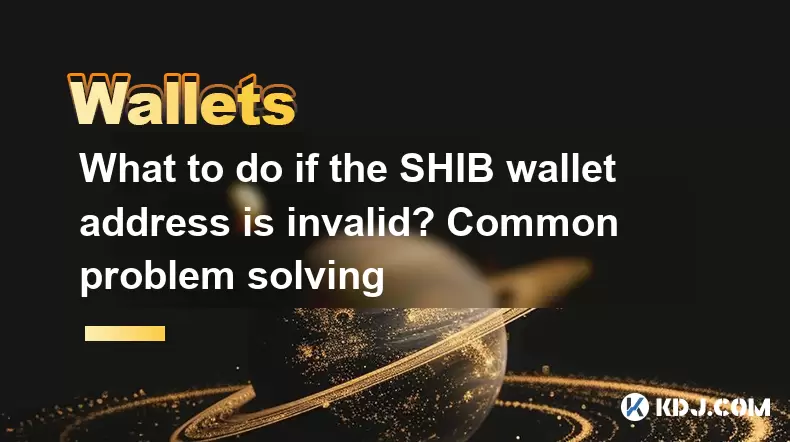
What to do if the SHIB wallet address is invalid? Common problem solving
May 14,2025 at 09:14am
If you're dealing with an invalid SHIB wallet address, it can be a frustrating experience, especially if you're trying to send or receive SHIB tokens. Understanding why this happens and how to solve it is crucial for anyone involved in the cryptocurrency space. This article will guide you through the common issues associated with an invalid SHIB wallet ...
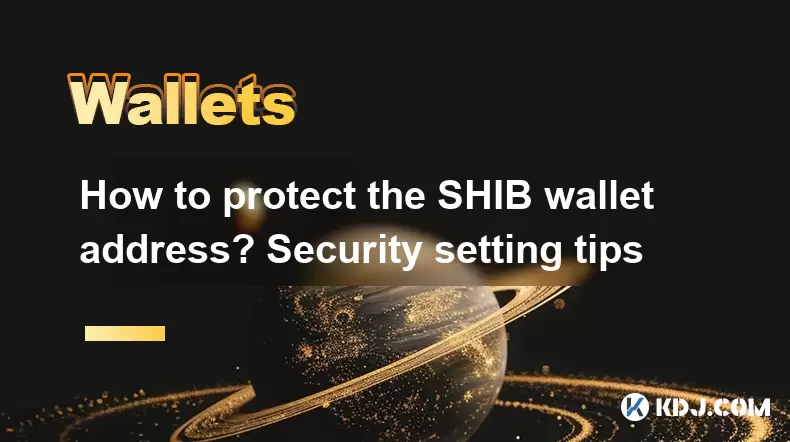
How to protect the SHIB wallet address? Security setting tips
May 13,2025 at 04:07pm
Protecting your SHIB wallet address is crucial to safeguarding your cryptocurrency assets. With the rise of digital currencies, securing your wallet has become more important than ever. This article will provide you with detailed security setting tips to ensure your SHIB wallet remains safe from potential threats. Understanding SHIB Wallet SecurityBefor...

How to migrate SHIB wallet address? Chain switching operation tutorial
May 14,2025 at 07:35am
Migrating your SHIB wallet address and performing a chain switching operation can be crucial for managing your cryptocurrency effectively. This process involves several steps that need to be followed carefully to ensure that your assets remain secure and accessible. In this tutorial, we will guide you through the process of migrating your SHIB wallet ad...

What to do if SHIB wallet address is wrong? Troubleshooting steps
May 14,2025 at 04:28am
If you've entered the wrong SHIB wallet address, it can be a stressful situation, especially if you've already sent your SHIB tokens. However, there are several steps you can take to troubleshoot and potentially resolve the issue. Let's walk through the process step-by-step. Verify the Transaction DetailsThe first thing you should do is verify the trans...

Can SHIB wallet address be tracked? Anonymity analysis
May 14,2025 at 06:50am
The question of whether a SHIB wallet address can be tracked and the level of anonymity it provides is a crucial concern for many users in the cryptocurrency space. SHIB, or Shiba Inu, is a popular meme token that operates on the Ethereum blockchain. Understanding the traceability of SHIB wallet addresses involves delving into the nature of blockchain t...

How to share the SHIB wallet address? Correct method analysis
May 14,2025 at 02:50am
Sharing your SHIB wallet address is a common task for those involved in the cryptocurrency world, particularly if you're dealing with Shiba Inu (SHIB) tokens. However, it's crucial to understand the correct methods to share your wallet address to ensure the safety and security of your funds. This article will guide you through the process and highlight ...

What to do if the SHIB wallet address is invalid? Common problem solving
May 14,2025 at 09:14am
If you're dealing with an invalid SHIB wallet address, it can be a frustrating experience, especially if you're trying to send or receive SHIB tokens. Understanding why this happens and how to solve it is crucial for anyone involved in the cryptocurrency space. This article will guide you through the common issues associated with an invalid SHIB wallet ...

How to protect the SHIB wallet address? Security setting tips
May 13,2025 at 04:07pm
Protecting your SHIB wallet address is crucial to safeguarding your cryptocurrency assets. With the rise of digital currencies, securing your wallet has become more important than ever. This article will provide you with detailed security setting tips to ensure your SHIB wallet remains safe from potential threats. Understanding SHIB Wallet SecurityBefor...
See all articles






















































































